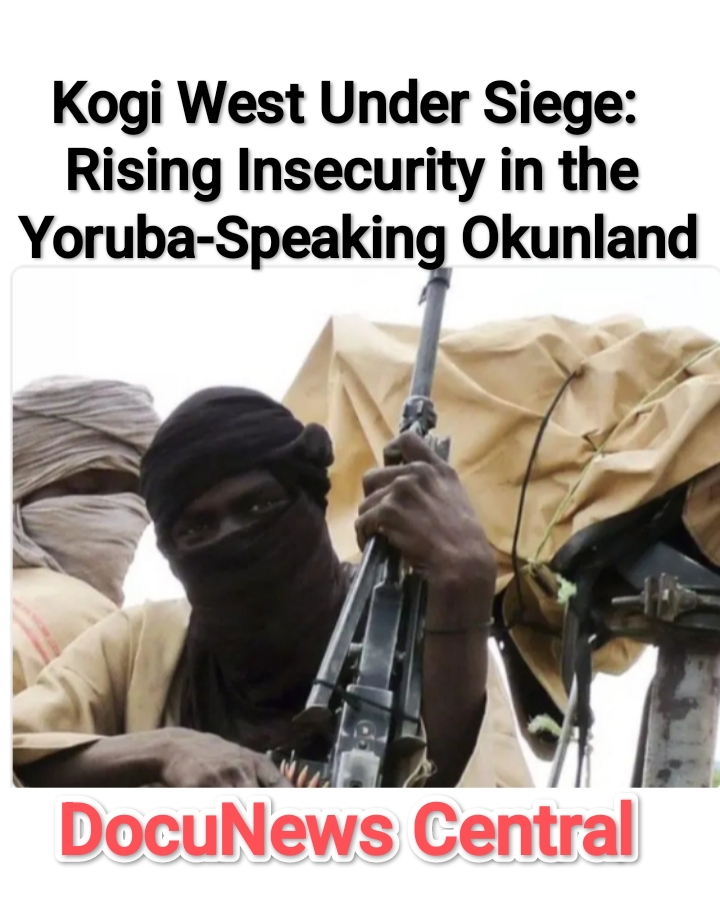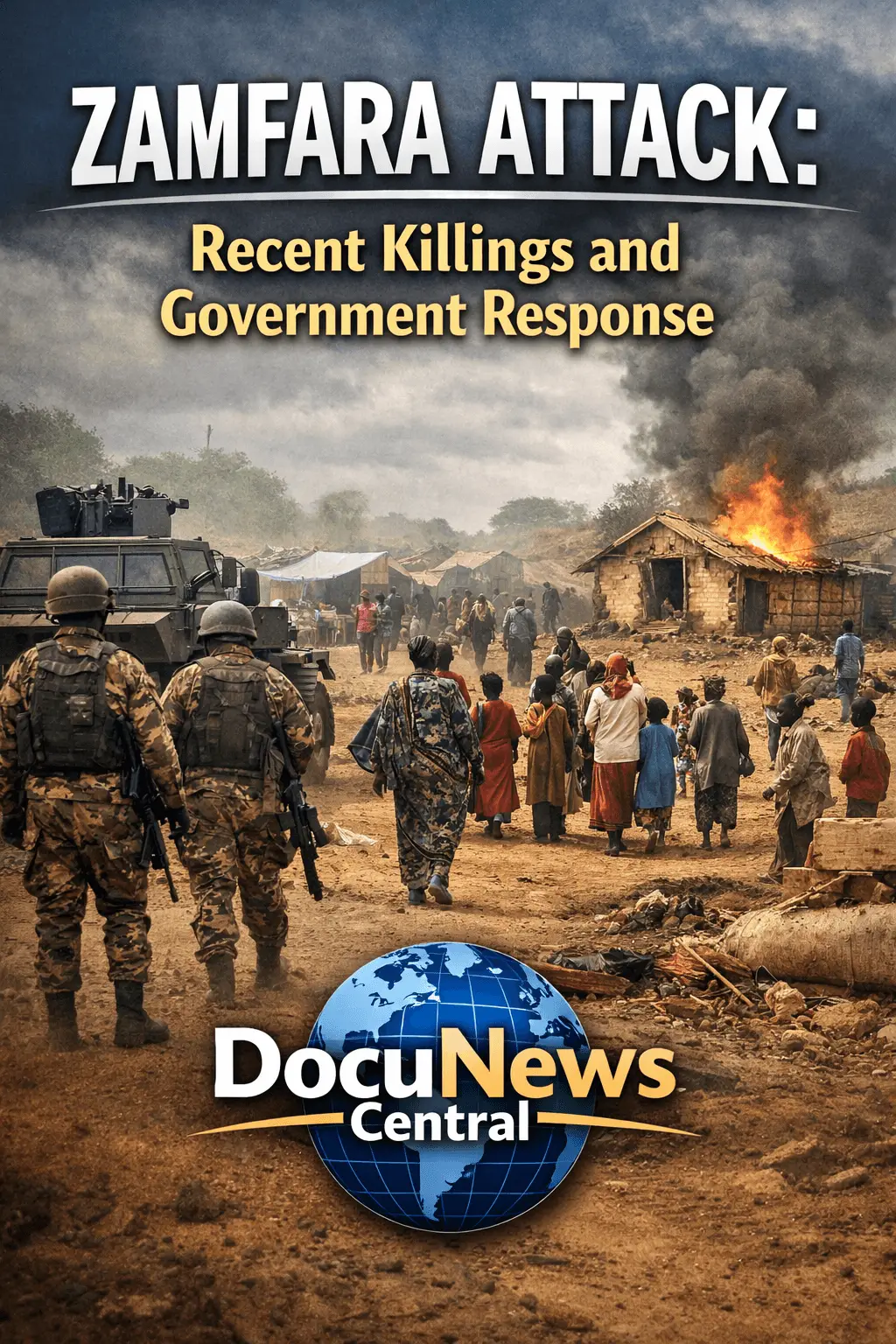
Kogi West Under Siege: Rising Insecurity in the Yoruba-Speaking Okunland — Causes, Impact and What Must Be Done
For several weeks and months, the people of Kogi West — the Yoruba-speaking region known as Okunland in Kogi State — have been witnessing a disturbing trend: nighttime home raids, travelers snatched from major roads, traditional leaders seized from their residences, and once-vibrant markets falling silent. As a result, many residents are choosing to remain indoors and refrain from traveling. Senator Sunday Karimi has openly declared that his district is “under siege” by kidnappers, with multiple local news sources echoing this warning.
This post explains the latest verified findings, links to credible reports, and offers clear recommendations. Importantly, DocuNews Central authored this briefing and reserves copyright. Read on.
Quick Summary of the Facts
- Escalating insecurity: Reports from major outlets show rising kidnappings and attacks across Okunland. Incidents include abductions, killings and community displacement.
- Senator Karimi’s warning: The Senator representing Kogi West described his constituency as being “under siege” by kidnappers, highlighting daily fear among residents.
- Government stance: The Kogi State Government acknowledged insecurity but insists there is no total breakdown of law and order.
- Recent incidents: Independent reports describe mass killings, abductions of monarchs and attacks in Yagba and nearby LGAs.
How the Crisis Began — and Why It Escalated
Insecurity in Nigeria’s Middle Belt and surrounding regions has complex roots. However, Kogi West’s current wave follows a clear pattern combining poor rural policing, criminal opportunism and the spread of banditry from nearby states.
- Criminal networks exploit unguarded roads: Bandits target remote routes and travelers. As a result, rural communities feel defenseless.
- Weak local defense: Local hunters and vigilantes lack adequate support. State forces face logistical challenges reaching rural zones.
- Economic pressures: Unemployment and ransom incentives make kidnapping profitable. Each incident encourages more.
Altogether, these drivers explain the sharp rise in violence and the growing sense that residents “cannot breathe freely.”
Who Is Most Affected — The Human Toll
- Families and commuters: Parents fear sending children to school. Traders avoid roads. Local trade and income decline sharply.
- Traditional rulers: Palace raids and abductions undermine local governance and morale.
- Security volunteers: Hunters and vigilantes have died confronting armed gangs, further weakening community defense.
- Women and children: Kidnappings of families have lasting psychological effects and destroy stability.
The human cost reaches far beyond ransom payments — it disrupts education, healthcare, and livelihoods.
What Authorities Have Done So Far
Both state and federal agencies have attempted various countermeasures:
- Official reassurances: Kogi authorities insist security forces remain active and have warned against politicizing insecurity.
- Security operations: Targeted raids and arrests have occurred, with some victims rescued, though attacks continue.
- Community calls: The Okun Development Association and Senator Karimi urge stronger federal intervention and joint patrols.
Why “Under Siege” Is a Loaded Phrase
“Under siege” can mean two things. Literally, it implies a total blockade. Figuratively, it means persistent, paralyzing threats. Residents and leaders use it metaphorically — their daily lives are dominated by fear, even if the state retains control.
Verified Incidents You Should Know
- Abduction of Oba James Dada Ogunyanda from his palace in Yagba West shocked the entire Okunland community.
- Mass killings in Yagba West left dozens dead and triggered population flight.
- Continuous kidnappings on highways have become routine, with commuters abducted for ransom.
Immediate Recommendations — What Must Be Done Now
- Boost joint patrols: Deploy combined police, army and vigilante teams on identified hot routes, including air surveillance.
- Enhance intelligence sharing: Merge local information with digital reporting systems for faster response.
- Secure vulnerable locations: Protect schools, palaces and markets with visible patrols and functional checkpoints.
- Support survivors: Offer trauma care, emergency funding and social support to displaced families.
- Cut ransom cycles: Strengthen anti-money-laundering oversight and punish ransom intermediaries.
- Train and equip local vigilantes: Legalize community security under government supervision to avoid abuses.
Long-Term Solutions
- Job creation and youth engagement: Economic inclusion reduces crime incentives.
- Infrastructure and surveillance: Better roads, lighting and communication improve security coverage.
- Swift justice: Speedy prosecution deters repeat offenders.
- Regional collaboration: Cross-state task forces can prevent criminals from shifting bases.
Sources and Verification
This report cites credible news outlets including The Guardian (Nigeria), Vanguard, SaharaReporters, Premium Times, and official Kogi State Government statements. Each outlet documented security incidents, government responses and statements from elected officials that confirm the crisis in Kogi West.
Final Word — Stay Informed and Stay Safe
If you live in or travel through Kogi West:
- Avoid night journeys whenever possible.
- Share travel plans with trusted contacts.
- Rely on verified official security alerts.
- Support victims through trusted community organizations.
DocuNews Central will continue monitoring this developing story and share verified updates only. For emergencies, contact local authorities instead of spreading unverified content that could cause panic.
© Copyright Reserved, DocuNews Central.











Your article helped me a lot, is there any more related content? Thanks! https://accounts.binance.info/en/register-person?ref=JHQQKNKN